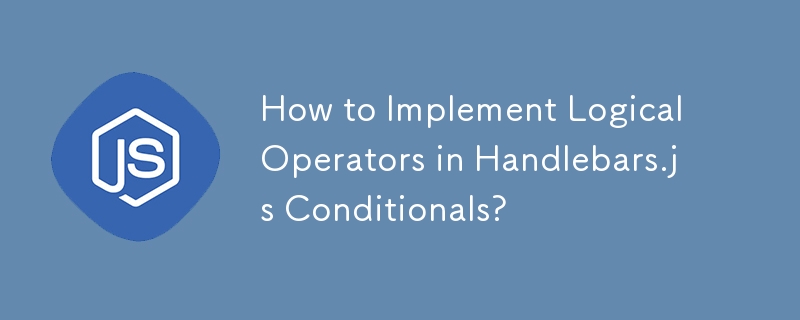

Using Logical Operators Within Handlebars.js If Conditionals
In the familiar realm of handlebars.js, conditional rendering via the {{#if}} block introduces a common programming conundrum: how to implement logical operators within this framework? One might instinctively attempt to directly include such operators within the conditional, as seen in the example provided.
However, handlebars.js does not natively support logical operators within its conditionals. This sparks a dilemma: should one embark on the arduous task of crafting a custom helper or delve into existing solutions? To answer this question, let us explore a 'cheat' method utilizing block helpers.
The Block Helper Technique
This approach may challenge the purist principles of Handlebars, but it effectively bypasses its limitations. By registering a custom block helper, one can implement the desired logical operations. Consider the following example helper:
Handlebars.registerHelper('ifCond', function(v1, v2, options) {
if(v1 === v2) {
return options.fn(this);
}
return options.inverse(this);
});Within your template, you can then employ this helper as follows:
{{#ifCond v1 v2}}
{{v1}} is equal to {{v2}}
{{else}}
{{v1}} is not equal to {{v2}}
{{/ifCond}}This method essentially enables the use of the equality operator within Handlebars conditionals. While not adhering strictly to its design philosophy, it provides a practical workaround for incorporating logical operations. It is important to note that this approach may not be suitable for all scenarios, but it offers a feasible solution for specific use cases.
The above is the detailed content of How to Implement Logical Operators in Handlebars.js Conditionals?. For more information, please follow other related articles on the PHP Chinese website!
 How to delete a database
How to delete a database
 isnumber function usage
isnumber function usage
 How to implement h5 to slide up and load the next page on the web side
How to implement h5 to slide up and load the next page on the web side
 How to use sort function
How to use sort function
 There is no network adapter in device manager
There is no network adapter in device manager
 What is the impact of closing port 445?
What is the impact of closing port 445?
 sort sorting function usage
sort sorting function usage
 What types of files can be identified based on
What types of files can be identified based on




